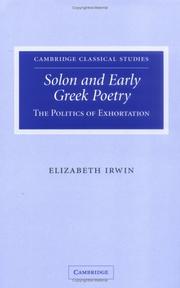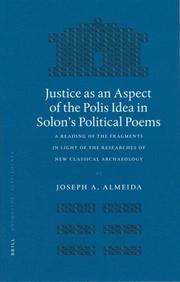| Listing 1 - 2 of 2 |
Sort by
|

ISBN: 0521851787 0521851785 0521101492 1107154227 0511182562 0511300662 0511482256 1280416327 0511136765 0511200234 0511134576 9780511134579 9780511136764 9780511300660 9780511482250 9781280416323 9780521851787 9780521851787 9781107154223 9780511182563 9780511200236 Year: 2005 Publisher: Cambridge, UK ; New York : Cambridge University Press,
Abstract | Keywords | Export | Availability | Bookmark
 Loading...
Loading...Choose an application
- Reference Manager
- EndNote
- RefWorks (Direct export to RefWorks)
The poetry of archaic Greece gives voice to the history and politics of the culture of that age. This 2005 book explores the types of history that have been, and can be, written from archaic Greek poetry, and the role this poetry had in articulating the social and political realities and ideologies of that period. In doing so, it pays particular attention to the stance of exhortation adopted in early Greek elegy, and to the political poetry of Solon. Part I of this study argues that the singing of elegiac paraenesis in the elite symposium reflects the attempt of symposiasts to assert a heroic identity for themselves within this wider polis community. Part II demonstrates how the elegy of Solon both confirms the existence of this elite practice, and subverts it; Part III looks beyond Solon's appropriations of poetic traditions to argue for another influence on Solon's political poetry, that of tyranny.
Greek poetry --- Political poetry, Greek --- Poésie grecque --- Poésie politique grecque --- History and criticism. --- History and criticism --- Histoire et critique --- Solon, --- Elegiac poetry, Greek --- Politics and literature --- History --- Poésie grecque --- Poésie politique grecque --- Arts and Humanities --- History. --- Criticism and interpretation. --- Literature --- Literature and politics --- Greek political poetry --- Political aspects --- Solon Atheniensis --- Solon van Athene --- Soloon --- Soloon van Athene --- Solon --- Solone,

ISBN: 9004130020 9786610467396 1417545496 1280467398 9047402138 9781417545490 9789004130029 9789047402138 Year: 2003 Volume: 243 Publisher: Leiden, Netherlands ; Boston : Brill,
Abstract | Keywords | Export | Availability | Bookmark
 Loading...
Loading...Choose an application
- Reference Manager
- EndNote
- RefWorks (Direct export to RefWorks)
This book examines the meaning of justice or dike in the political poems of Solon from a new interpretative perspective. The first two chapters argue that neither standard historical nor literary treatments have provided an adequate foundation for understanding Solon’s dike . The main defect lies in an inability to connect Solon’s concrete political work with his poetic perceptions. The book’s central proposal is that the polis idea, from new classical archaeology, provides an objective standard for an interpretation of Solon’s dike , which remedies this defect. The third chapter sets forth the polis idea, which becomes the measure for an examination, in the final two chapters, of Solon’s view of dike . The book thus exhibits an interdisciplinary approach to Archaic poetry.
Political poetry, Greek --- Excavations (Archaeology) --- Politics and literature --- Justice in literature. --- History and criticism. --- -Justice in literature --- -Politics and literature --- -Literature --- Literature and politics --- Literature --- Greek political poetry --- Greek poetry --- Archaeological digs --- Archaeological excavations --- Digs (Archaeology) --- Excavation sites (Archaeology) --- Ruins --- Sites, Excavation (Archaeology) --- Archaeology --- History and criticism --- Political aspects --- Solon --- -Poetic works --- Athens (Greece) --- -Politics and government --- Justice in literature --- Poésie politique grecque --- Fouilles (Archéologie) --- Politique et littérature --- Justice dans la littérature --- Histoire et critique --- Solon, --- Poetic works --- Athènes (Grèce) --- Politics and government --- Politique et gouvernement --- Solone, --- Poetic works. --- Politics and government. --- Solon Atheniensis --- Solon van Athene --- Soloon --- Soloon van Athene --- Political poetry, Greek - History and criticism. --- Excavations (Archaeology) - Greece - Athens. --- Politics and literature - Greece - Athens.
| Listing 1 - 2 of 2 |
Sort by
|

 Search
Search Feedback
Feedback About UniCat
About UniCat  Help
Help News
News